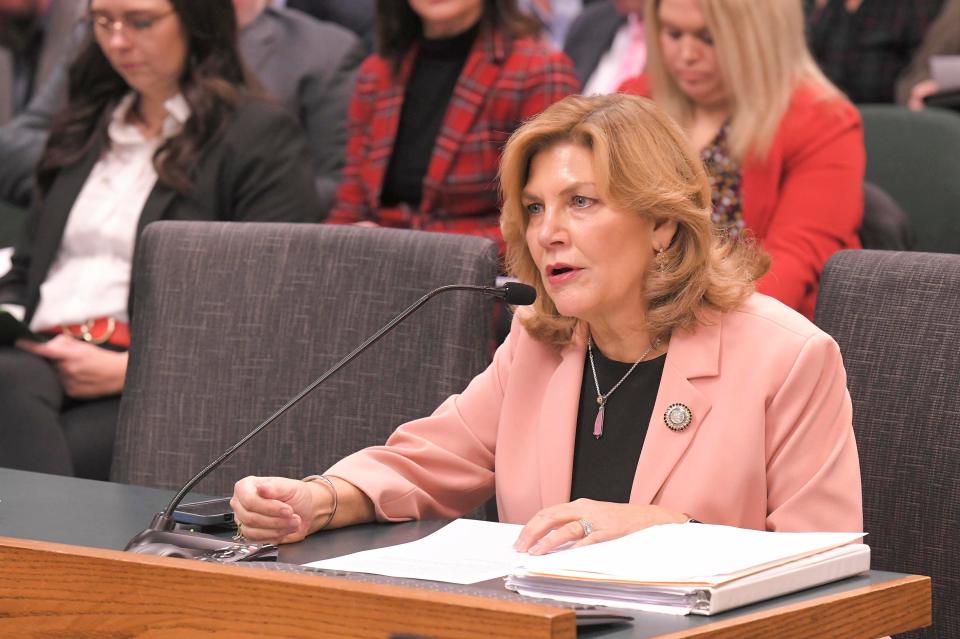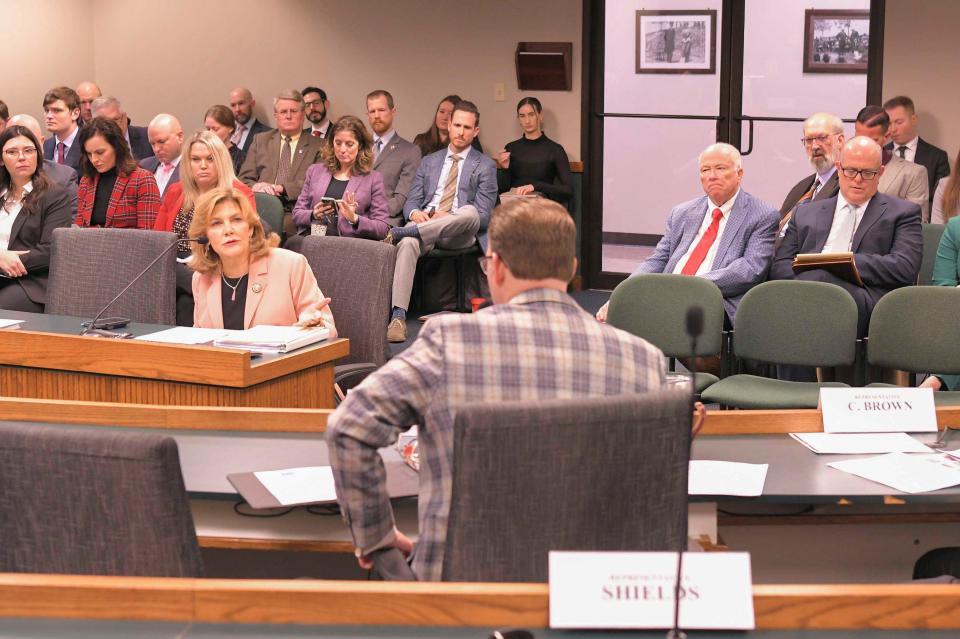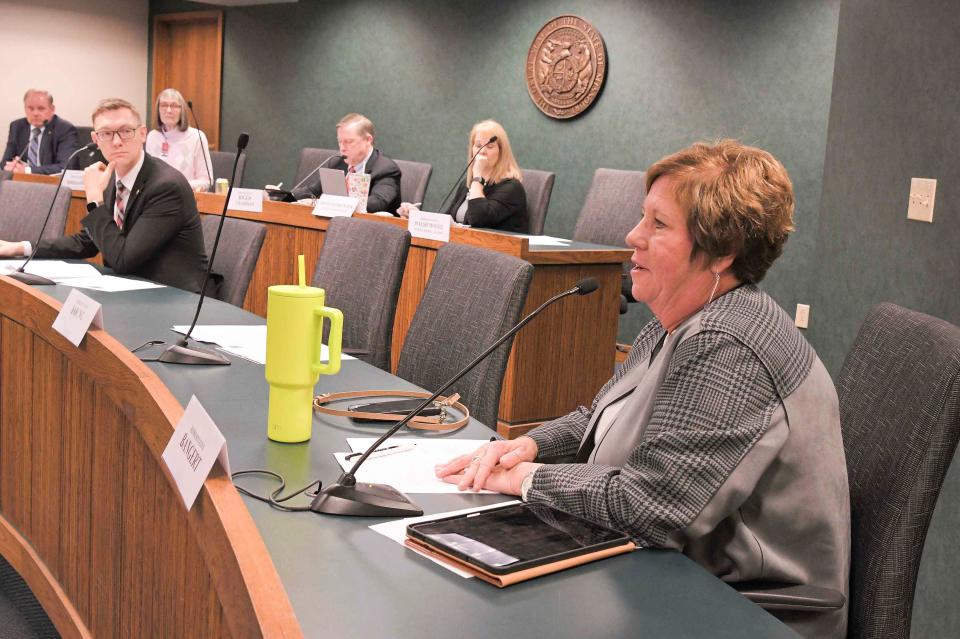Early in session, lawmakers set sights on addressing child care crisis in Missouri
Early in the legislative session, state lawmakers have set their sights on improving access to child care in the state.
Addressing this issue has bipartisan support, although legislators are not in unison about how to accomplish their shared goal.

Rep. Brenda Shields, R-St. Joseph, introduced legislation aimed at providing tax credits in a three-pronged approach to supplementing the industry. Part of the program allows taxpayers who donate to child care facilities to receive the tax credits.
A second part would issue tax credits to employers who provide child care for their employees. A final part uses tax credits to supplement child care providers directly, enabling them to increase worker pay, grow their capacity to take on new clients and pay for other related needs.
“This is not government care being run by the government,” Shields said. “It is local businesses, churches, family homes, group homes, who will create the child care that they need in their community.”
Each bucket of tax credits would be capped at $20 million. If all $20 million in each category is used, it can be increased by 15% in areas in the state that are designated child care deserts. Among Missouri’s 114 counties, 94 are classified as child care deserts.
The fiscal note on the bill estimates that it could cost the state around $70 million. However, Shields points to the fact that Missouri lost an estimated $1.35 billion last year because there were not enough workers to fill positions in the economy, according to a study by the U.S. Chamber of Commerce Foundation.
“If we collected the tax on those employees if they paid income tax, that'd be $280 million that we would collect,” Shields said.
Shields feels that the lack of affordable child care can keep many parents from working. She cited one daycare that cost $75 a day to take care of an infant, which is about $20,000 annually.
With Missouri’s median income at about $30,000 annually, some parents may choose for one person to stay home and raise their child rather than work just to pay daycare. The expense is exacerbated when families have more than one child.
Committee hearing reveals bipartisan support for child care legislation
Shields' legislation, House Bill 1488, was heard by the Missouri House Workforce and Infrastructure Development Committee on Wednesday. Similar legislation has been proposed by state Sen. Lauren Arthur, D-Kansas City, and assigned to the Senate’s Governmental Accountability Committee. This committee does not currently have a meeting scheduled for next week.
Other legislation in the House and the Senate looks to exempt child care facilities from paying personal property taxes, pending voter approval. Another bill from Sen. Greg Razer, D-Kansas City, would create a cost-sharing program between the state, employers and employees to supplement child care costs.

Shields spoke to committee members about the impact a lack of child care can have on the economy, citing facts that 50% of Missouri businesses surveyed report this is a problem and 63% of those businesses said it impacts employee retention.
“Not only have businesses reported it's a problem,” Shields said. “Parents report that child care isn't available and when they do (find child care) 43% say that is unaffordable.”
Attracting new businesses to the state would become easier if more child care was available, Shields said in the hearing. When marketing itself to businesses, the state usually highlights its central location in the nation, infrastructure, ports, railways, airports.
“It's time to change the conversation around child care and consider this as critical infrastructure,” said Kara Corches of the Missouri Chamber of Commerce and Industry.

Rep. Gretchen Bangert, D-Florissant, shared the struggles that her children have faced with finding child care for their infant. Her son and daughter-in-law, like many Missouri parents, had their child on lists for several child care facilities months before their child was born, and waited months to finally be accepted to only one of the locations. She feels they are lucky in two ways.
“Number one, to get in; number two, they can afford it,” Bangert said. “If not, we would have lost either an engineer or a nurse in our workforce because they would have had to have stayed home to take care of their child.”
Legislation sees overwhelming support from Missouri organizations
Over more than an hour of public comments, only one witness in the committee hearing spoke in opposition to Shields' bill, with more than 20 testifying in support — what committee Chairman Rep. Lou Riggs dubbed a “kumbaya caucus.”
Lisa Pannett, representing ArmorVine, which promotes Christian principles of freedom and liberty, said that there is not a child care crisis, but rather a legislative crisis caused by creating problems where none exist.
“We are expanding cradle to grave Marxism on the backs of taxpayers, and we have shackled independent providers by limiting children per provider,” Pannett said.
Samuel Lee, representing Campaign Life Missouri, spoke in support of the bill, which he considers to be pro-life legislation. In his work with pregnancy resource centers and maternity homes, clients have reported the greatest struggles with a lack of child care, lack of housing, and lack of transportation.
“The lack of child care can be the deciding point of whether or not a pregnant woman or a young family decides whether to continue that pregnancy to term,” Lee said.

Brad Jones, state director for the National Federation of Independent Businesses, applauded the legislation as a boon for small businesses. He said about 40% of the small business industry has jobs that can’t be filled, and hopes that this legislation would enable parents wanting to work to reenter the job market.
“If this piece of legislation will do something to help in revitalizing some of the folks that are out there that really want to work and just can't, we’re certainly supportive of it,” Jones said.
Matt McCormick, president and CEO of the Columbia Chamber of Commerce, pointed to a national statistic from the U.S. Chamber of Commerce, which showed that last month there were 0.7 workers for each available job in the country. In Columbia, that figure is 0.6 workers per open position. Local businesses report access to child care as the number one issue facing workers.
“That basically means we don't have enough workers for the jobs that we have,” McCormick said. “This isn't news, this isn't breaking. This is something that we're dealing with in every community. Workforce is our number one issue.”
McCormick, who is a parent himself, points out the unfortunate price comparison between the college expenses his family is preparing for and child care costs in the state.
“We talk about the cost of education being a barrier to our workforce, but what we need to be talking about is the cost of child care being a barrier to our workforce,” McCormick said. “Because what I'm looking at in college is what they're looking at for their three-year-olds.”
More: Mark your calendar with these important 2024 Missouri election dates
Matt Morrow, president of the Springfield Area Chamber of Commerce, also stressed the importance of addressing the child care crisis. The organization hosted two round-table discussions on Thursday to discuss the issue with local stakeholders.
“This workshop brings together employers, child care providers, parents, educators to look for partnership and we've been able to find some opportunities in those meetings and we'll find some more tomorrow,” Morrow said in Wednesday’s hearing. “Employers in particular have never been more motivated than they are today to try to get innovative and can add resources to to help resolve this issue.”

Rep. Bill Hardwick, R-Dixon, asked Morrow his opinion on the economic changes that have happened in recent years that caused such a great child care crisis. Hardwick recounted memories of past years when there were more applicants than jobs to fill them, without tax credits to supplement child care.
“There's a bit of a perfect storm that's taking place. One is just very simply demographically driven. We haven't been replacing our population at the rate that we used to,” Morrow said.
“For families to function, those families typically need two incomes more often than they maybe did 40 or 50 years ago. There are more single-parent families than there were in that period of time as well, which means in that case, there's not really even the option of a parent staying home,” Morrow said.
This article originally appeared on Springfield News-Leader: Missouri lawmaker has a plan to address statewide child care crisis

